Peter MALONE
Hamam
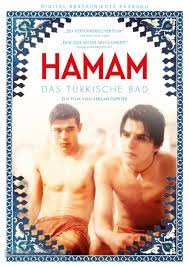
HAMAM
Italy, 1997, 95 minutes, Colour.
Alessandro Gassmann, Francesca D'Aloja,Carlo Cecchi, Halil Ergun, Serif Sezer, Mehmet Gunsur, Basak Kokluka, Alberto Molinari, Zozo Toledo.
Directed by Ferzan Ozpetek.
Hamam is the Turkish word for steam baths, a strong Turkish tradition.
This is a first feature film by Turkish director, Ferzan Ozpetek, who obviously has a great affection for Istanbul as it becomes a character in this film, the familiar vistas, the waterways, the neighbourhoods, the streets, the baths… However, he left Turkey and settled in Italy and remained there, making films for the next decades.
Over the decades, the director has had a strong interest in dramatising gay themes, sometimes the characters, sometimes the issues, very strongly and more openly from the late 2010s, Goddess of Fortune and the issue of gay fathers adopting and bringing up children, Nuovo Olympo, more visually explicit, the study of a relationship that begins intensely separation in space and time.
Alessandro Gassman plays Francesco, an architect designer, married, the relationship as seen somewhat brittle, and the discovery that the wife was having an affair with a partner. Scenes in Rome.
However, an old lady dies in Istanbul, Francesco’s aunt, leaving him the Hamam that she began and which has now lost its popularity and is in a state of disrepair. Francesco has to come to terms with this, his relationship with his aunt, finding letters she had written to his mother which had been returned unread, explaining the attraction and the delight of living in Istanbul. The local family, strong personalities, welcome him.
A chance experience at the baths changes his attitude, clashes with his agent who wants the property sold for setting up a shopping centre, his entering wholeheartedly into the renovation of the baths. At the same time, he is attracted towards the young man of the family. His wife then arrives, intending to divorce him, discovering his relationship, a melodramatic scene at the dinner table. However, the wife comes to understand her husband a bit more.
The ending is quite unexpected and unexplained, Francesco stabbed by a visitor front door and dying in the street. A sad effect on the family. A sobering effect on his wife – and her wandering Istanbul, having read the letters of the aunt and how liberating it has been to live in that city.
- The films of the director, his first film, his Turkish origin, settling in Italy? His relationship themes, gay themes?
- The Italian locations, Rome, homes, business, interior restorations? The Turkish locations, the views of Istanbul, affection for Istanbul, the noted sites, the vistas, the streets, the homes, the baths? The musical score?
- Introduction to Marta and Francesco, the marriage, brittle, business association, interior decorations, contracts, absences from home, Marta and her relationship with Paolo?
- The Istanbul story, the house, the maid, the death of the old lady, grief in the street? The neighbourhood, so many people gathering, the bonding? Her will, leaving the baths to her nephew? The further elaboration of her story, her letters to her sister, returned unread, her moving from Italy, at home in Istanbul, kindness, love, settling, freedom of spirit, the baths?
- Francesco, the news of his inheritance, his going to Turkey, meeting Zozo, Zozo and his agency, the contract for the baths, transformed into a shopping centre, the discussions, the hard lady dealing? Francesco, being welcomed, getting to know the family, to appeciate his aunt, his memories of her when he was a boy? His wanting to get back home, contact with Marta, wanting the sale to go through, in a hurry?
- The family, the kindly mother, the dignified father, the daughter studying, the son as cameraman? The bonding, the meals? Oscar as family friend, confidant?
- Francesco, wandering, in the rain, the baths, his being invited in, the experience of the baths?
- His change of heart, deciding to renovate the baths, their state of disrepair? The plans, the work, decoration, design, his involvement? The support of the family, the spirit of the family and neighbourhood? Francesco and his being attracted to Mehmet?
- Marta, her arrival, her manner, her relationship with Paolo, bringing the documents? Being welcomed by the family, accommodation, her manner, wandering the city and enjoying it, the rain, giving her ring to the old lady?
- The night, the relationship between Francesco and Mehmet? The eruption at the dinner table? The argument, the effect on each of them? Taunts? But a certain understanding, Marta wanting to move out, the discussions with Oscar, some affection for Francesco?
- The shock of the ending, the assault on the street, Francesco stabbed, Mehmet and blood, everyone at the hospital, his death? Marta visiting?
- Francesco giving Marta the letters of his aunt, her reading them, her looking at Istanbul through this perspective, and her future and Istanbul?
Moving Finger, The/ 1984
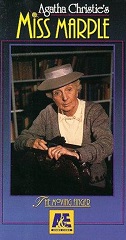
THE MOVING FINGER
UK, 1984, 102 minutes, Colour.
Joan Hickson, Michael Culver, Deborah Appleby, Andrew Bicknell, Sabina Franklin, Richard Pearson, Douglas Hamlet, John Barnett, Penelope Lee, Juliet Whaley.
Directed by Roy Boulting.
The Moving Finger is a second of Agatha Christie’s Miss Marple stories to be adapted for television starring Joan Hickson. Joan Hickson does seem to be the embodiment of Agatha Christie’s interpretation of Miss Marple (very different from Margaret Rutherford and Angela Lansbury) and several of the Joan Hickson stories being remade with either Julia Mackenzie or Geraldine McEwan.
The atmosphere of the 1950s is very strong, the small town, touch of isolation, the minister and his wife and life centred on the church, the local doctor, the local lawyer, the local gossip. At the centre of this story is the brother and sister, he wounded and crashing his plane, she caring for him.
The title refers to the poison pen letters which have been circulating in the town, attacking people and their characters, revealing this behaviour, the mystery of their being typed on the typewriter at the church charity.
There are various aspects, different relationships in the town, the lawyer’s daughter acting erratically but finally key to Miss Marple’s revealing the murderer – and the issue whether poison pen letters are written by women or men.
The film was directed by Roy Boulting, one of the Boulting brothers, very prominent in film direction in production in the British industry in the 1940s, 50s and 60s – and, for Roy Boulting, into the 80s.
- The popularity of Agatha Christie mysteries? Miss Marple? Joan Hickson as Miss Marple?
- The settings, the 1950s, the rural villages, homes, doctors offices, solicitors offices, the church, charities? Costumes, decor, cars…? Authentic atmosphere? The musical theme?
- The title, poison pen letters?
- The introduction to Gerry and Joanna, the war background, recuperation, settling in, the aunt, the home, friends, at the church, the noting of the various characters in the village?
- The situation with the letters, the pages, from the book, the typewriter, at the charity? The targets, the accusations, vilification? The effect on various people? Gerry receiving one?
- Mr Pye, gossip, at the church, his comments? A possible suspect?
- The range of people, suspects, Symington, law firm, his secretary, his wife at home, the troubles with Megan, the two boys? The doctor, from Wales, his sister as receptionist? At the house, Partridge, the dismissal of Beatrice, her boyfriend, the minister and his wife?
- The invitation for Miss Marple, Joan Hickson’s portrayal, age, intelligence, noticing, and the interactions with the chief inspector?
- The death of Mrs Symington, the note, the poison? The death of Beatrice, concealed?
- The inquest, the testimony, the verdict of suicide? Miss Marple dissenting?
- The complications, Gerry and his interest in Megan, the trip to London, the Pygmalion transformation, the return home, her being poisoned – and this being revealed as a ploy by Miss Marple?
- The doctor, and Joanna, the attraction, Joanna receiving a letter?
- The work at the charity, the typewriter, the donation?
- The resolving of the situation, Miss Marple trapping Symington, his motivations, Miss Holland and her looking after his boys, his motivations, the letters, a male writer rather than female, Beatrice realising what it happened after her fight with her boyfriend?
- Miss Marple and the explanations, satisfactory mystery, and solution?
Coup de Chance
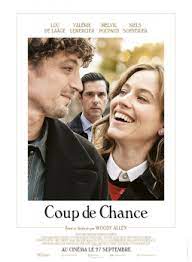
COUP DE CHANCE/ STROKE OF LUCK
France, 2023, 93 minutes, Colour.
Lou de Laage, Neils Schneider, Melville Poupaud, Valerie Lemeercier
Directed by Woody Allen.
This Paris-set film is tres francaise. But, as always, his films are always tres Woody Allen. We find here that French situations and characters and Woody Allen situations and characters are very compatible. The French dialogue and the opening and closing credits en Francais look as they do in all of his films. Plus a characteristic jazz soundtrack.
Woody Allen was filming Coup de Chance in Paris as he turned 87, with more than 50 years as a stand-up comic, talented writer, prolific film and television director.
Even though we are in Paris and the locations in tone are authentic, we might as well be in New York City with the characters and themes – and the subtitles offering us the Woody Allen humour and turn of phrase.
And here are the perennial Woody Allen themes that we have responded to for decades. There is enthusiastic love. There is infidelity and consequences. Initially, there are hints of crimes and misdemeanours. And it certainly comes to a climax that way.
Woody Allen is served well by his French cast, Lou de Laage (luminous in so many films like The Innocents) is Fanny, the wife of fashionable wealthy counsellor to the rich (to make them richer) Jean, revealed as more and more controlling (Melvil Poupaud).
And Neils Schneider is a genial writer who, Cpoup de Chance, sees his schooldays sweetheart, Fanny, in the Paris Street. A stroke of luck. But, Woody Allen keeps reminding us that life is so often unlucky, while Jean declares frequently that we make our own luck.
There is a strong presence by Valerie Lemercier as Camille, Fanny’s mother, intervening and leading the plot to its conclusion.
Woody Allen fans will be very pleased.
- The title, the issue of luck, ransom luck, controlled like?
- Woody Allen, his career, writing and directing in his mid-80s? In France?
- Woody Allen’s American sensibility, corresponding to French sensibility, his writing, conversations, remarks, ironies, humour?
- The situation, Fanny, her first husband and his addiction, divorce, Jean and his attraction, the party, the proposal, the marriage, happiness? Her work at the auction, and details sequences of artwork, business, auctions? Jean, his age, personality, devoted husband, social life, friends, going hunting, travels, helping the rich to get richer? The happy marriage?
- Alain, his stroke of luck, encountering Fanny, memories of school years, his crush on her, her memories? His marriage and divorce? His being a writer? Away from friends, returning, the encounter in the street, the conversation, his following up, phone calls, lunches, the attraction, the beginning of the affair, his devotion, his apartment, Fanny becoming more involved, happy, moody?
- Fanny’s life, at work? The transformation with Alain? The hunting weekends, the friends, her being bored, not liking the friends, not going hunting? A greater dependence on the rendezvous with Alain, in love, the issue of honesty and her husband? His noting her moodiness?
- Jean, his reputation, the story of the suicide of his partner, suspicions? His being a controller,, socialise…? His suspicions?
- The detective agency, the boss, the severe detective, the details, the quick solution of the case, following Fanny, Alain is identity, the two together, the photo and the recording? Jean and his reaction?
- Jean and his contact with the Eastern European criminals, the rendezvous, the past and the death of his partner, the arrangement for taking Alain, the apartment, his body in the bag, the plane, dropped over the ocean? Reporting back to Jean?
- The character of Camille? Fanny’s mother, in America, coming to help her sister? Getting on well with Jean? Her style, manner, forthright? Coming back, suspicions about Fanny, her daughter confiding in her? The story of the missing partner, the joke about alien abductions? Her search of Jean’s room, the agency card, her going, her pretence, confirming her suspicions?
- Jean, the phone call from the agency, his plans for Camille, calling his associates, the plan for the hunting, the rifle, the accident? Persuading Camille to go, Fanny, the issue of the tablets, her returning to Paris to get them, going back to Alain’s apartment, finding the manuscript, phoning her mother?
- The hunting, the setup, the deal with the shooter, not having used a rifle, using his own, and explaining that it be all interpreted as an accident? Jean leading Camille through the forest, teaming up with his associate, his suddenly being shot – and the hunters mistaking him for an animal, his being the victim of an accident, his colleague running away, Camille standing amazed?
- Fanny, coming to terms with the affair, the disappearance of Alain, the renewal of vows at the party with Jean, upset at her mother’s accusations, the suspicion, following through?
- Woody Allen themes, relationships, betrayals, crimes and misdemeanours.
Anyone But You
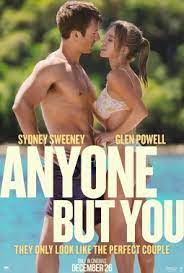
ANYONE ABOUT YOU
US, 2023, 103 minutes, Colour.
Sydney Sweeney, Glenn Powell, Gata. Alexandra Shipp, Hadley Robinson, Dermot Mulroney, Rachel Griffiths, Bryan Brown, Michelle Hurd, Charlee Fraser, Joe Davidson, Darren Barnett.
Directed by Will Gluck.
Romcoms! Their success depends on whether we want more romance or more comedy.
Shakespeare, over 400 years ago, offered a title, perhaps a definition: Much Ado about Nothing. (But he also offered a comedy of errors and stated that all’s well that ends well.) And, despite appearances and less than Shakespearian dialogue, Anyone but You is a contemporary, slight re-working of Much Ado, a Shakespeare quote to begin with and quotes turning up in all kinds of places to keep us on track.
Actually, Shakespeare had tried the basic plot but seems to have awarded the winner of the battle of the sexes with the less than equal macho title, The Taming of the Shrew. And there was a nine updated version called To Things I Hate about You, which it also serves as a title here.
It all starts in New York City and an amusing toilet-seeking disaster, one way of bringing Bea and Ben (as we remember Beatrice and Benedict of old) together, a quick bonding, then misunderstandings and hostility, or, rather, enmity. They are played with enthusiasm by Sidney Sweeney and Glenn Powell.
In fact, most of the action takes place in Sydney, all the characters are gathering for Bea’s sister, Halle and her wedding to Claudia. But Bea is something of a disappointment and her parents always intervening, making suggestions, wanting to control. So, in Sydney, multiple glossy appearances by the Harbour Bridge, the Opera House, the harbour and ferries – and a koala! And, heavens, there are Bryan Brown and Rachel Griffiths, he Claudia’s father, she Halle’s mother, with Gilbert Mulroney as her husband..
Writer-director, Will Gluck (comedies from Easy A to Peter Rabbit) tries to make the comedy broad enough for everyone (and does) but there are many jibes of antagonism hoping that this will be as you like it.
At one stage, a character remarks that something is “stupid but nice”. Yes, more or less.
- Romantic comedy? American style? 2023? And action in Sydney? The Australian tone?
- Based on Shakespeare, Much Ado about Nothing, the quotes and signs of themes throughout the film? Bea and Ben?
- The introduction to Bea and Ben, Shakespearian expectations, New York in the 2020s? The situation, Bea and the toilet, at the counter, Ben and his intervention, smooth talking, their walking, going home, his cooking, chatting, the night, her stealing away, returning, overhearing Ben’s derogatory remarks, upset? Her contacting her sister and friends?
- Six months later, the club, the party, the prospective marriage, Claudia and Halle, Halle as Bea’s sister, Peter and the connection, Bea and Ben meeting, immediate hostilities?
- The marriage in Australia, the flight, the two on the plane, Bea getting the cake, tangled in the seat? At the airport, Peter driving? Taken to the mansion, Sydney’s northern beaches?
- The insertion of location photography, the harbour bridge, the Opera house, the harbour, even the koala? Attraction for American tourists? But the difficulty of Beau, the rather dumb Australian hunk!
- The introduction to Claudia’s family, her genial father, her mother, family relationships, Australian? The introduction to Bea and Halle’s parents, very American, concerned about their daughter, their ambitions, controlling and interfering, law, not certain, secretly withdrawing? Her relationship with Jonathan, the break, her parents inviting him to the wedding, his awkwardness, the parents pressure?
- The sequences of tension between Bea and Ben, the taunts, the wisecracks, animosity? The plans to bring them together, Peter and Roger and their drama for Ben? Claudia and Halle for Bea? The couple realising what was being planned?
- The decisions, to appear as a couple? Conversations, pretence and then back to reality? The expedition to the country, the koala, the spider in Ben’s pants, the naked episode? The contrivance about the sunglasses on the yacht, swimming out? Issues of swimming?
- The portrait of the parents, the Australian laid-back, the interfering Americans? And Jonathan in the middle?
- Margaret, the past relationship with Ben, her being with Beau, provocative, wanting to rekindle the friendship, the various interventions, her being cautious, kissing Ben and Bea seeing it and misinterpreting?
- Beau, Australian slang, the shower sequence, uninhibited, sports, immoral not to go for the best wave to surf!
- Preparations for the wedding, travelling to the boat, the party, the Titanic joke, Bea in the water, Ben diving in, the helicopter rescue?
- The buying of the cake, returning home, the dog, the ribbon, the upset with the cake? The impact on Claudia and Halle?
- The buildup to the wedding, Roger presiding, his words about love, the declarations? The celebrations?
- Bea and Ben, getting closer, the kiss, the realisation, the night together, his sudden leaving, her misinterpretation? Hostility, leaving and going for a walk?
- Ben, the promise of meeting at the Opera House, going into the water, the rescue, deliver to the Opera House, the various proposals, his proposing?
- A happy ending all round, all’s well that ends well, Shakespearian ending, and many comedy of errors along the way, parents behaving well, the finale of a Romcom?
Vidhan/ Writ
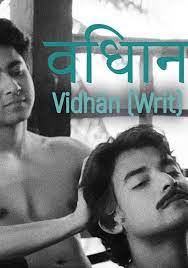
VIDHAN/ WRIT
India, 2020, 84 minutes, Colour.
Ranojoy Bishnu, Rohan Verma, Anuj Jain.
Directed by Manoj Rai.
This brief film comes with all kinds of acknowledgements, screenings at festivals, awards. It caused some surprise for audiences who did not expect an Indian film with gay themes.
The film focuses on a group of gay men who gathered together every so often, comparing notes, arranging partners, taking their orientation for granted, alert to gossip, but confident in themselves.
The central character is a financial chief in a business, paid well, seen often in his office, chatting with a co-worker, female, who also is a guest at the parties. At one of the meetings, he encounters a young man who says he is an IT programmer but also earns more as a male escort. He goes home with the financier, they begin a relationship, always well paid.
This is a very wordy film – and it is about words. There is an initial discussion about the nuances of a Hindu word, the two men discussing the issue, the financial taking it to work for a solution. And, this kind of conversation continues throughout the film, especially in the bedroom sequence with the pillow talk is all about words, their origins, in Hindi, in English… Unless one is a philologist or a linguist, these conversations, very long, will test the patience and attention of many audiences. But, the precision of language and meaning is a key metaphor for the depth of the relationship.
There are ups and downs in the relationship between the two men, the sex worker going on various designations, the financial finding this difficult. And, there are more discussions at the parties, especially with the key organiser of the parties and a range of partnerships.
There is an unusual device where the financier who has a moustache – and the sex worker who doesn’t, are seen alternately in sequences where the financier has shaved and the sex worker has the moustache.
Finally, the two together, there is a visit from a masseur who was in a previous relationship with the financier, and they sit down to a meal – and discussion.
Frank in its presentation of men of homosexual orientation and the relationships but very reserved in the visual presentation of the encounters between the men.
Not a Tame Lion
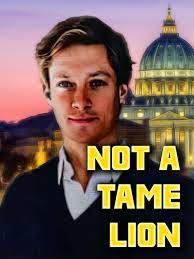
NOT A TAME LION
US, 2022, 119 minutes, colour.
Narrated by Kai Morgan.
Directed by Craig Bettendorf.
This is a documentary portrait of Yale scholar, John Boswell.
Boswell came from the American south, a military family which moved about, a mother who encouraged her children to explore the culture of the countries where they had been assigned. She had a talent for languages. And her son inherited this, fluent in 14 different languages associated with Biblical studies.
Boswell was familiar with the Bible but also moved into the area of Medieval Studies, producing a book on how children were abandoned in the Middle Ages. However, his research led him to investigate same-sex relationships throughout history, especially in the Middle Ages, and social attitudes and ecclesiastical attitudes towards homosexuality. He wrote four books and won awards.
This film has been made by long-time gay activist director, Craig Bettendorf, and narrated by actor, Kai Morgan who has worked in other Bettendorf films. The film was made and released almost 30 years after Boswell’s death.
As regards Boswell’s religious and faith stances, he was brought up as Episcopalian but studied theology and was influenced by Cardinal John Henry Newman and the theme of development of doctrine. He became a devout Catholic after studying the history of the church. He was a daily Massgoer.
But he was also gay, had argued philosophically and theologically for his stances on same sex equality, enabling him to be devoutly Catholic while disagreeing with Church teaching on homosexuality and living in a longtime partnership. Sadly, he died in 1994 of an aids -related illness.
John Boswell had a lively personality, attractive, drawing students to his lectures and to research. The director has interviewed three of his long-term friends and academic associates, reminiscing in great detail about John Boswell. And there is an interview with his sister, Patricia Boswell offering family insights, and British academic, Elizabeth Archibald, disciple, fellow student, writer on the Middle Ages and sexuality themes including incest.
John Boswell was a researcher, going to a great number of libraries, with access to many Vatican documents. He visited various monasteries, some hostility from the monks on Mount Athos because of his opinions on homosexuality, photographing pages of documents or getting his associates to do the filming, amassing a great deal of material on the issues. He was particularly interested in same-sex marriages, the status in the early church and Middle Ages, including the martyrdom of Saints Sergius and Bacchus, arguing for the acceptance of such arrangements, with blessings.
There are excerpts from John Boswell’s lectures throughout this documentary, lively presentations. His research was acclaimed and influential. However, there are a number of scholars who argued that he had not proven his theses, and some opposition from gay activists who differed in perspective on his stances.
This is a film about research in the 1980s and 1990s, a reminder of changing perspectives on sexuality in those decades, but introducing a range of research which demands serious consideration, both for and against.
Man Who Sold His Skin, The
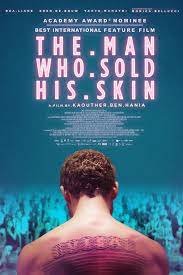
THE MAN WHO SOLD HIS SKIN
Tunisia/Belgium, 2022, 104 minutes, Colour.
Yahya Nagayni, Dea Liane, Koen De Bouw, Darina Al Joundi, Christian Vadim, Wim Delvoye, Monica Bellucci, Saad Lostan.
Directed by Kauotha Ben Hania.
The writer-director of this film, Tunisian, visited the Louvre in 2011 and saw the human painting, Tim, the work of Belgian artist, Wim Devoye. She was intrigued, especially learning that Tim had been optioned and is contracted to sit at the whim of his owner, displaying the painting on his back.
So, based on a true story, this film is a fictionalised version, nominated for Oscar consideration, and featuring the actual artist, of Wim Devore, as the insurer in this film.
The setting is Syria, a young man in love with a woman whose family, wealthier, is in favour of an arranged marriage with a diplomat based in Belgium. Then civil war breaks out. The man is arrested, interrogated, and, with the help of his sister, is this able to escape to Lebanon. Working there for some time, he encounters an artist who admires his back, which the audience has seen prominently, and asks if he can use his back for a painting, a painting of the format of a visa. He agrees.
The consequences are a visa, travel to Europe, comfort, sitting in galleries displaying the painting. He has a social life. He does contact his mother back in Syria but is caught up with the comfort of his life. Then, he is auctioned, protest against the Civil War and human trafficking making a display, the man himself terrifying those of the auction with a prank that seems that he has a bomb.
When he is interrogated, the translator is the woman he loves, now married and living in Belgium, her husband jealous, attacking the man, destroying a painting, also arrested, and his wife pleading for the man to help him.
Freed by the artist, the man then contact his mother who has been injured during the Civil War and returns home.
An arresting story, freedom for artists and their choices, their canvases… But, questioning the person whose body is used for the art, ownership, echoes of human trafficking…
- Based on a true story? Belgian artist? (The actual artist appearing as the insurer in this film, Wim Dell for a)?
- The initial setting, Syria, 2010-2011, the Civil War, the repercussions? Sam Lee and his relationship with A beer, in the train, the proposal, the tension, the exuberance, the announcement, the dance? The reality of the situation, Sam RV and his family, work, appears family’s disdain, the arranged marriage with Ziad, his position in Belgium?
- Sam, his experiences, arrest, interrogation, arranging with his sister, the escape to Lebanon on, crossing the border, settling in Lebanon on, his friends, work, contact with his family, the news about A beer’s wedding?
- Jeffrey, the artist, his background, approaching Sam? The earlier shots of Sam’s back, preparation for the proposal? The proposal, Sam’s reaction, passport, going to Europe, the demands on him? The painting, the fees are on his back, the design, style, the effect on Sam?
- Saw a, working with Jeffrey, her control, manner, relationship with Sam?
- The exhibitions, Sam’s role, sitting in posture, head bowed, the display of his back? The media, museums, visitors?
- The effect on Sam, the comfortable life, the hotel, finance, time, arriving, his dressing gown, the display?
- Abeer, in Belgium, her marriage, her jealous husband? Sam and his difficulties, Serena taking his passport to control him? The issue of the option, his being sold? The protests by the Syrians at the auction, his appearing, fears of a bomb, the prank?
- His interrogation, a beer as the translator, communication with her, her husband’s reaction, suspicions, coming to the Gallery, destroying the painting, the fight, his being arrested, a beer and her plea for Sam’s help, his hesitation, helping?
- The issue of the option, the issue is identity, the parallel with human trafficking? Jeffrey and his letting him go?
- The contact with his mother, life in Syria, her injuries, his sister? The decision to return to Syria?
- The offbeat story, issues of art, issues of human exploitation?
Alibi/ 1929
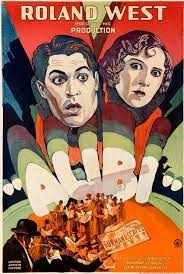
ALIBI
US, 1929, 90 minutes, Black-and-white.
Chester Morris, Harry Stubbs, Regis Toomey, Mae Busch, Eleanor Griffith, Irma Harrison, Purnell Pratt, Pat O'Malley.
Directed by Roland West.
Alibi is a piece of American cinema history.
Released in 1929, there was also a silent version but this is an early talking. It is readily available on YouTube.
It received Oscar nominations in the early years of the Academy Awards, the best film, for Best Actor for Chester Morris, Best Set Design for veteran William Cameron Menzies.
For many this will be just a curio, a very early gangster film, proceeding the classics of the 1930s. It has a familiar plot, a prohibition gangster release from prison, teaming up with his old connections, organising a robbery from a garment warehouse, shooting a policeman, creating an alibi where he was at the theatre with his wife, the daughter of a police chief, but slipping out during the interval, the tickets providing the alibi.
There are a emotional conflicts, the daughter of the policeman friendly with both the gangster and another policeman, marrying the gangster without realising his evil intent, rejecting her longtime friend, another policeman.
A lot of the action takes place in a nightclub, there are frequent sequences of the dancing of the chorus line. In this context there is an undercover policeman, played by Regis Toomey, friendly with the girls, insinuating himself with the criminals, being used to provide information for the alibi, but the wife also wanting to telephone the police, the criminal is realising that they were being doublecrossed, the confrontation and a very long and emotional deaths scene for Regis Toomey.
There is a range of criminals, a boorish old-timer with business connections imposing on his long-suffering wife. And there is a chorus girl in love with the undercover policeman.
Ultimately, there is a confrontation, cowardly behaviour by the criminal, his being shot with blanks and fainting, and his being taken away, the police achieving their goals.
For tastes in the succeeding decades, even during the 1930s, this film will have seemed very old-fashioned. However, film students and commentators have a lot to say about the talent of the writer-director, Roland West, and his cinematic techniques.
Lord Edgeware Dies/ 1934
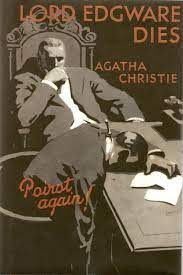
LORD EDGWARE DIES
UK, 1934, 80 minutes, Black-and-white.
Austin Trevor, Jane Carr, Richard Cooper, John Turnbull, Michael Shepley, Leslie Perrins, C.V France.
Directed by Henry Edwards.
By the beginning of the 1930s, Agatha Christie had become a popular mystery writer and had introduced her Belgian detective, Her curl Poirot. Lord Edgware Dies was published in 1933 and filmed the following year. However, it was the third of the Poirot films made, alibi and Black Coffee in 1931 with Austin Trevor playing Poirot in each film.
They were popular films in their time, with the popular British filmmaking style and cast. However, 40 years later, Albert Finney embodied Poirot, followed by a number of films with Peter Ustinov and, then, as all Agatha Christie fans appreciate, David Sue Shea was Poirot in all of the novels and the short stories.
Here, Poirot is rather tall, and does not correct the comment that he is French! Commentators remarked that Henry Cooper, who plays Captain Hastings, was more the size and appearance of Poirot and Austin Trevor rather more like Hastings. And, as part of the dialogue, Hastings does matter good heavens! And Inspector Japp says Good Lord!
Within the 80 minutes, the film establishes an atmosphere, beginning in a nightclub, a singer offering an impersonation of a more famous singer, Lady Edgware who is in the audience. Lady Edgware wants a divorce from her husband, seeks the help of Poirot, he and Hastings interviewing Lord Edgware and finding he is willing to divorce his wife. There are complications with friends, some of whom advise and warn Poirot, and another hair to the Edgware fortune.
All the complications, all the clues, all the misdirections until a final denouement where Poirot gets all the evidence, especially from Lady Edgware has made, and a final confrontation.
A curio to look at now, but significant in the history of Agatha Christie films. Available readily on YouTube.
CJ7
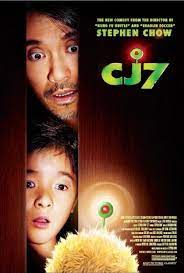
CJ7
Hong Kong, 2008, 88 minutes, Colour.
Stephen chow, Jiao Xu, Yuqi Huang.
Directed by Stephen Chow.
Here is a fantasy entertainment for young boys, 10 plus or minus, their fathers, and, by extension, girls and mothers in the family.
The film was written and directed by Stephen Chow who had established quite a reputation in Hong Kong during the 1980s and 1990s, films with a light touch. He achieved some international popularity in 2004 with Shaolin Soccer and, especially, Kung Fu Hustle. This film followed immediately – and there was a later animated version of the story.
This is a story of Dickie Chow, son of a building site labourer who wants more for his son than he ever had, sending him to an expensive school, but Dickie labouring under disadvantage with soiled sneakers, put down by the supercilious teacher, and bullying boys.
However, the key to the film is the appearance of flying saucer, landing in the rubbish tip, Dickie’s father finding a remnant and bring it home is a toy. However, it is more than that, shape-changing, with all kinds of powers, finally appearing as a small dog toy. And there is a sequence where it transforms Dickie’s life, special glasses for passing exams, special powers for high jump, superstrength confronting the bullies… And then he wakes up and the contrast in real life is very different.
Audiences were surprised at the time, as were many who did not realise it as they watch the film, that Dickie Chow is played by a young actress, Jiao Xu, who has had a successful career. Chow himself plays the father.
There is a blend of realism with the sequences fantasy. There is a particular perspective on the widower father and trying to bring up his son, to better his son, while working on a building site and being the butt of comments from his boss. However, there is also the friendly and charming teacher at school.
So, entertaining sequences but a message about honesty and integrity no matter what our situation underlying the whole film.
- Entertaining and instructive for the young audience, boys 10 plus or minus, father’s?
- The town, the neighbourhoods, the expensive school, its grounds, classrooms, corridors, playing fields? The hovel homes? Supermarkets? The building sites? Hospital? The musical score?
- The story of Dickie Chow? Audience surprise that he is played by a young actress? Her being convincing as Dickie? Age, the death of his mother, his father uneducated, working on the building site, the hard work, pushing the wheelbarrow and falling back, the attitude of the boss, ticking him off, yet paying for his wife’s funeral rites, criticising the school, the taunting that Dickie cheated at maths? A context for Dickie going to school?
- Dickie, bright personality, the bullying students and the clashes, his dirty sneakers, not allowed to play, defending the big girl, her standing by him at the sports, the big bully and the fighting? The wealthy young boys and their taunts? The effect on Dickie, his father urging him not to fight, being proud of being poor, his declaring this in the classroom as his ambition?
- Miss Yuen, at school, kindly, interest in Dickie, discussions with him, about his father, the encounter with his father, helping Dickie, the father and his gratitude, the accident, Miss Yuen her helping Dickie?
- Dickie, the boys and their toys at school, comparisons, at the supermarket, his wanting the toy, creating the tantrum, the aftermath with Miss Yuen, surly with his father, wanting the fan for sleeping? His father hard on him, the beatings?
- The father, going to the dump, collecting things, the lamp, its not working, examining the television, the flying saucer and its departure, his bringing home the toy? Dickie and his playing with a toy, the bouncing ball?
- Father and son watching the television, witness to the flying saucer?
- The toy, at school, C1 as the prize toy, Dickie calling the ball CJ 7, playing with it, its contortions, power, the electric fan, emerging as the doglike toy, its powers?
- Dickie and the toy, going to school, hundred percent in the test, defying the teacher, the arrogant teacher and his putting down of Dickie and not wanting to touch him, the enormous high jumper leap into the stratosphere… And defeating all the boys and their bullying? The big bully and his confrontation with the big girl? His pride?
- The contrast with the reality, the poop, in the classroom with the boys, the teacher, the sports, continued pooping, Dicky being hosed down, changing his report, 100%?
- The truth, his father’s disappointment, the effect on Dickie? The toy, losing its power, becoming a toy, around his neck?
- His father, on the building site, the collapse, the fall, hospital, his death?
- The final fantasy, CJ 7 and its power, and reviving his father? The boys excepting him, Miss Yuen and her help, a happy future?